Gail Duncan remembers the procedure that saved her babies as something out of a sci-fi movie.
The scary news. The rush to surgery. The parade of men and women in white lab coats. The laser aimed at her abdomen.
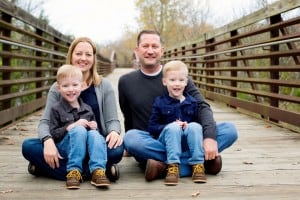
Gail and Jeff Duncan are loving every minute with 4-year-old twins Gunner and Garrett, and they’re grateful to Regional One Health for the boys’ healthy start in life.
While the lead-up felt otherworldly, the ending to the story is entirely and beautifully human: two precious baby boys who are now busy, healthy 4-year-olds.
Regional One Health’s highly-specialized Maternal Fetal Medicine program – the region’s only one of its kind – helped give Gail and husband Jeff that happy outcome.
“It was an incredible experience. I truly believe we were meant to be in Memphis and to come across their group,” Gail said. “They’re fantastic. I can’t say enough about them.”
Gail and Jeff were preparing a move to Memphis from Manchester, Tennessee, when she learned she was pregnant with twins. Jeff had been accepted to a Certified Registered Nurse Anesthetist program in Memphis.
Because Gail’s twins were identical, her doctor in Murfreesboro told her she’d need close monitoring. She researched physicians in Memphis, winding up in the office of Dr. Giancarlo Mari, MD, FACOG, medical director of the Regional One Health High-Risk Obstetrics Program.
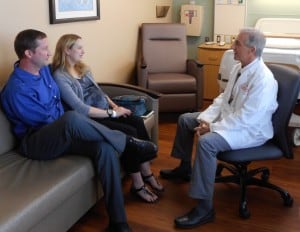
Gail and Jeff met with Dr. Mari and his team so often during her high-risk pregnancy that they came to see them as family.
“At my first appointment, they did a very thorough ultrasound,” said Gail, who was 21 weeks along at the time.
“I remember very clearly that after the lady did the ultrasound, she kind of disappeared for a little while. Dr. Mari came in and started looking. Afterwards he said, ‘When you’re dressed, let’s go into my office to talk.’ I knew something was up.”
It was Twin-Twin Transfusion Syndrome, a rare and serious condition in which abnormal blood vessel connections cause blood to flow unevenly between twins sharing a placenta.
Babies are at risk for early delivery, neurological damage and even death. Without treatment, Gail’s twins had a 10 percent chance of survival.
“Dr. Mari started telling me the options, including a laser procedure he said was the absolute best option. This was Wednesday, and he told me, ‘I can get you in Friday.’”
He also encouraged Gail to do her own research. When she did, one name kept coming up: Dr. Mari himself, and his team at Regional One Health. “He’s such a humble man,” Gail said. “It was only when we did our research that we found out he’s a bit of a rock star in his field!”
Gail scheduled the procedure, a Laser Ablation Placental Anastomoses, in which doctors use a camera to guide a laser through a mother’s stomach and uterus into the placenta. They laser abnormal connections, being careful not to disrupt healthy connections that benefit the babies.
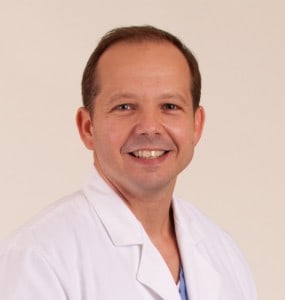
“In maternal fetal medicine, we’re protecting the mother as well” as the babies, Dr. Schenone notes.
The carefully choreographed operation followed years of preparation.
Gail was one of the first patients receiving this treatment at Regional One Health, but the Maternal Fetal Medicine service had been started years before, when the healthcare system began assembling experts and highly-specialized equipment. Regional One Health hired Dr. Mari, the go-to doctor in the Midwest, to lead the way. Mauro Schenone, MD, who had trained with Dr. Mari, came onboard; later, Pedro Argoti, MD rounded out the team.
To prepare for procedures that put the life of both mother and baby in their hands, they created stringent standards – procedures must be the only way to prevent miscarriage or death: “If I can leave the intrauterine environment untouched, that is preferable,” Dr. Schenone said. “We don’t want to put an instrument there unless it’s strictly needed.”
They also stipulated that all surgeries would be done at Regional One Health. “In maternal fetal medicine, we’re protecting the mother as well. I want to do these surgeries in a place where I have resources to take care of the mother,” Dr. Schenone said.
Finally, they trained tirelessly. “We worked very hard to prove to Dr. Mari we were ready,” Dr. Schenone said. “He wouldn’t take a patient until after many simulations where the team showed we were ready to go from assembly to checking equipment to actually lasering a placenta.”
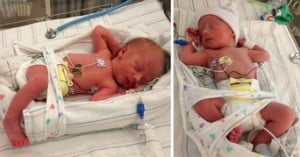
Born at 4 pounds, 5 ounces and 4 pounds, 4 ounces, the babies spent 10 days at the Regional One Health NICU before Gail and Jeff brought them home.
Their diligence paid off for Gail. Her procedure went perfectly, and she had no further complications as doctors continued to monitor her closely. “I knew things would be OK when Dr. Mari asked me if we’d picked out names,” she recalls.
Finally, at 35 weeks, Garrett and Gunner decided the time had come and were born at 4 pounds, 5 ounces and 4 pounds, 4 ounces. “They really just had to work on gaining weight,” Gail said. “Ten days later, we brought them home.”
She laughs at how nurses called them “the Beach Boys” thanks to their blond hair and skin that looked sun-kissed due to a touch of jaundice – and also because of their laidback personalities. “I remember one nurse saying, ‘They’re just perfect little gentlemen.’”
That hasn’t changed. The boys were easy babies – rarely fussy and sleeping through the night at five months – and are now good-natured 4-year-olds.
Garrett takes being born two minutes before Gunner to heart. He’s more likely to take the lead, and loves to color and listen to books. “He very much likes things in their place – he gets that from me – and he doesn’t like people to be unhappy. He’ll ask me, ‘Are you happy?’”
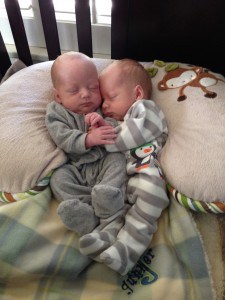
Garrett and Gunner have always been close, and they even took it easy on mom and dad in terms of being good-natured babies and sleeping through the night.
Gunner is more active physically, with a big imagination and sense of humor. “He likes to figure things out with his hands – it’s pretty cool what he comes up with,” Gail said. “He is more like my husband – he’s really quick-witted and he’s got a funny personality.”
Both boys love karate, and Gail and Jeff plan to introduce them to different activities so they find their passion. With October birthdays, they’ll start kindergarten in 2020.
In other words, two little lives that started like a sci-fi movie are now quite normal. “They’re just typical boys. They love to play outside with sticks and rocks, and run and ride bikes,” Gail said.
She’s grateful to Regional One Health for giving them that chance.
“I don’t want to think about what would have happened if we hadn’t found Regional One Health – one or both of them may not have survived,” she said.

Today, the boys love karate, riding bikes and playing outside. “They’re just typical boys,” Gail says.
“I truly felt like they were rooting for us. They wanted the boys to be healthy, and they wanted to do everything they possibly could to get them there.”
That’s what drives the Maternal Fetal Medicine team, the only one in the region that treats Twin-Twin Transfusion Syndrome. “It’s a very unique program,” Dr. Schenone said. “There are only a few centers in the whole country, and we’re one of them. In this area of the map, we’re it.”
Therefore, the team sees its role not only as treating dire diagnoses, but giving families hope and walking a difficult journey at their side. When the outcome isn’t the desired one, patients still know their baby mattered and every avenue was exhausted to save him or her.
And when the outcome is a happy one, it’s magical. “The stakes are high, and babies are referred typically with a very somber prognosis,” Dr. Schenone said. “Our days aren’t always sunny, but those cases where you help a baby survive, it keeps you going. It’s a beautiful experience.”
To support the cutting-edge lifesaving work of physicians like those in our Maternal Fetal Medicine practice, visit www.regionalonehealth.org/foundation.

